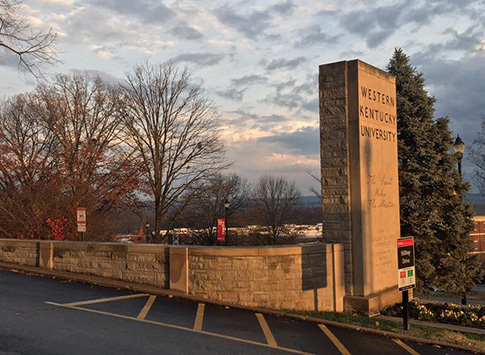WKU News
President Caboni shares Budget Stabilization Plan Recommendations
- President Timothy C. Caboni
- Friday, February 23rd, 2018

Dear Fellow Faculty and Staff:
You are aware of the substantial budget challenges we face as an institution. This is the result of cumulative enrollment declines, increased fixed costs and a decision made last spring to fill our budget hole with one-time dollars.
Last fall, I convened the University’s Budget Council, which is advisory to the President, and asked them to address both our current $15 million shortfall and to make recommendations that will put WKU on a more sound financial footing for the future. The four faculty, five staff and one student who make up the Budget Council have spent well over one hundred hours during the last several months on this critical effort. I’m appreciative of their service and dedication, and I commend them for the time, talent and energy they have devoted.
The attached report by the Budget Council was presented to the Board of Regents today. I have accepted either some portion of - or forwarded to the strategic planning committee for inclusion in their work - 32 of the 35 individual recommendations. The remaining recommendations will require further examination, so I will take those under advisement.
These reductions eliminate inefficiencies and redundancies; they reorganize units to increase nimbleness and market responsiveness; and they pay close attention to where we must maintain our investments for future growth. The reductions will not be across-the-board or incremental. Over time, those degrade the performance and effectiveness of the entire organization.
We must consider affordability as we make these decisions, and we also cannot pass these costs on to our students. The Budget Council recommendations protect the core mission of serving students in the classroom and buffer our student retention efforts. Those areas directly responsible for recruiting, retaining and graduating students also will experience minimal reductions.
Among the big things we will do to achieve a balanced budget are: eliminate the University College; return the management of our three Regional Campuses to DELO; and permanently reduce the size of our workforce across the enterprise.
As of July 1, the academic programs in University College will go to other colleges across the institution. We will consolidate the functions within University College that duplicate campus support systems and integrate others into Student Affairs or appropriate campus departments.
Returning the regional campuses to DELO ensures a more market-driven focus and student service orientation. We will maintain our strong commitment to our area partners, and we will continue to help build the workforce those communities need. Most of the savings with this move will be created through finding efficiencies and removing duplication within the current organizational structure of our regional campuses.
Finally, the recommendations from the Budget Council will result in a significant reduction in our total workforce at WKU. As you are aware, several months ago we initiated a hiring slow-down and began a stringent review process to capture vacant positions as part of this budget reduction effort. Out of more than 2,000 budgeted positions on campus, we will eliminate 40 vacant positions created through attrition. An additional 90 to 100 filled positions will be eliminated to meet the targeted budget reductions.
University administrators will make those decisions during the next few days, and employees whose positions are eliminated will be notified in person by mid-March. I know that this already has caused significant concern throughout our campus community, but we simply must give managers the time to make appropriate decisions. They are closest to their operations and are best situated to make final determinations about reductions in their respective divisions and colleges. All employees who will be displaced as a result of this budget reduction effort will be paid through June 30 unless they separate from the University prior to that date. Human Resources staff stand ready to provide guidance and support throughout this difficult process. More detailed information will be forthcoming from Human Resources in the days ahead.
I know this is painful. Unfortunately, this is only the first phase. As I have described on multiple occasions, this first $15 million is largely a result of enrollment shifts during the past 4 years. The next challenge for us will come in April when we know the results of the state budget, which is likely to include a significant reduction in our state appropriation and a substantial increase in our employer contributions to the state pension systems. We also will have a better sense in April of what our fixed cost increases will be; and, to be realistic, we will plan for another year of enrollment decline.
This is a difficult time in the life of our institution. Our fortitude and our leadership will be tested. This is certainly not what I envisioned for my first year as President, but we cannot stick our heads in the sand and fail to address it. My hope is that the strategies we are employing now will ensure that future budgets are more stable, predictable and adequate to support our core mission.
In the face of these challenges, I encourage you to support one another and to continue serving our students as we always have. Thank you for all you continue to do for our university.
Timothy C. Caboni
Some of the links on this page may require additional software to view.

